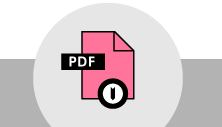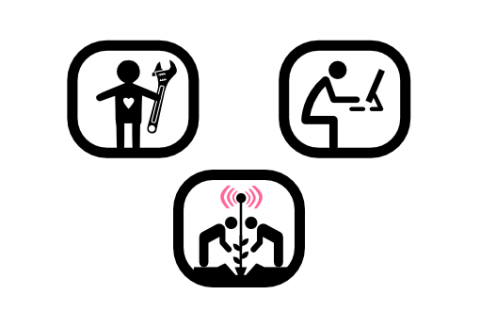
Introduction
Network building requires a combination of social, technical and physical tasks, such as talking to people, listening, forming partnerships, solving wireless engineering problems and installing hardware. These skills are almost never found in a single person. More often, an individual is strongest in one area.
In these activities, you will examine the different skillsets you will need to plan, build and maintain your network and how to find them in your community.
Time required: 45 minutes.
MATERIALS + SUPPLIES NEEDED
Pen
Paper
Activity 1: Network Skills
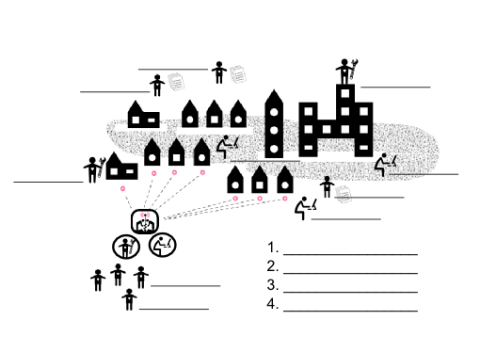
As a group or within small groups, write a list of skills that will be necessary to plan, build and maintain your wireless network. Think about the skills needed to do tasks such as making flyers, flashing routers, mounting hardware, connecting electricity to rooftops, buying equipment, and finding other community members that would like to be involved.
Next, think of the different skills you know exist within the community and how those skills might benefit the network. For example, an artist can help make flyers or create art where there are wireless nodes, and a carpenter can help make hardware mounts for different locations. Add those community skills to the list.
Try to engage any local amateur (HAM) radio operators. When it comes to running cable and mounting antennas, they will likely have experience and tools, as well as typically a strong sense of community service.
Roles in the Network
Rather than trying to do everything alone, it is best to involve multiple people with different skillsets. Below are three common types of contributors and example skills that contribute to a healthy community network:
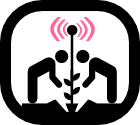 Organizer |
Outreach Working with and recruiting volunteers Holding community meetings Reaching out to important community partners Conducting community surveys Budgeting and finance |
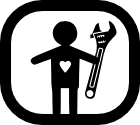 Handy-Person |
Mounting hardware on rooftops or in parks Connecting electricity to the sites Building mounts for others to use Teaching people how to build their own mounts Purchasing and managing equipment |
 Techie |
Installing mesh software on routers Configuring routers Teaching others to install and configure routers Troubleshooting network problems Creating local applications |
Individual people in the community may take on these specialized roles. Or, depending on who is involved, some people may share a role or take on more than one role. Also, some skills may fall within multiple roles. By narrowing down the ways people can contribute, it is easier for more people to participate.
How does this list compare to the list you made in the first activity?
Activity 2: Name that Person
Next to the skill write the kind of person, organization or the specific individual that you know has that skill. People you might include: electricians, carpenters, graphic designers, local business owners, hardware shops, specific community leaders and organizers, artists, etc.
For this activity you can use the list below or use the list of skills you developed in the brainstorming session.
| Fill-in the kind of person, organization or the specific individual with this skill. | |
|---|---|
| Outreach. | example:community center |
| Working with and recruiting volunteers. | ____________________________ |
| Holding community meetings. | ____________________________ |
| Reaching out to important community partners. | ____________________________ |
| Conducting community surveys. | example:Anna |
| Budgets and finance. | ____________________________ |
| Mounting hardware on rooftops or in parks. | ____________________________ |
| Connecting electricity to the sites. | ____________________________ |
| Building mounts for others to use. | example:carpenter |
| Teaching people how to build their own mounts. | ____________________________ |
| Purchasing and managing equipment. | ____________________________ |
| Install mesh software on routers. | ____________________________ |
| Configuring routers. | ____________________________ |
| Teaching others to install and configure routers. | ____________________________ |
| Troubleshooting network problems. | ____________________________ |
| Creating local applications. | ____________________________ |
What skills does the group already have? What skills do you need to find? Identify a strategy for reaching out to each person, organization or group you have identified. Where would you find these skills? Who in your community might take on these roles?

